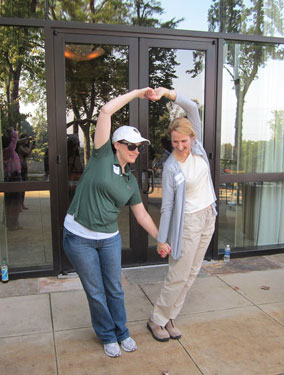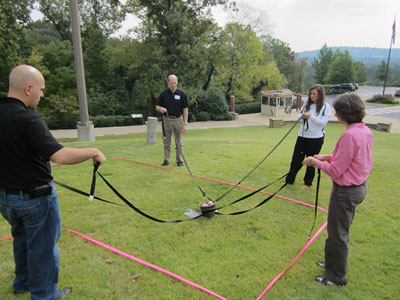 |
| Tracee Synco and Kristi Menear participate in an ice breaker warm up activity at the EDP Kickoff at Vulcan Park. |
Janelle Chiasera, Ph.D., began her academic career at The Ohio State University, where she completed her graduate work, held positions as a research and teaching associate and ultimately became a faculty member.
But when the opportunity to join UAB arose in 2006, Chiasera didn’t hesitate. She had career goals and ambitions she wanted to reach, and UAB was able to provide the avenues she needed to achieve one of those goals — becoming an academic leader.
“Three things drew me to UAB,” Chiasera says. “Number one was an opportunity to take on a leadership role as a program director. Number two was the strong articulation of a vision and what we needed to do to be successful in the School of Health Professions.
“And number three was the strong commitment UAB and the School of Health Professions had to building leaders from within. I loved working at Ohio State and I loved the people, but I couldn’t say no to the great opportunity presented to me by UAB.”
UAB has steadily worked to create leadership opportunities for employees and recently added to its ever-expanding arsenal of programs a new track, one in which Chiasera continues to grow her skills. The Executive Development Program – developed by the Office of the Provost, Human Resources, and the Organizational Development Strategy Committee – is designed to provide customized leadership development opportunities for high-potential faculty and staff. The goal is to ensure that UAB always has a pipeline of well-prepared leaders ready to move into higher positions when the time arrives.
|
Core development competencies The Executive Development Program developed a list of six leadership competencies critical for executive level leaders at UAB based on analysis from interviews with UAB deans, vice presidents and the provost. The competencies are:
|
Chiasera is part of the inaugural 10-person class of the Executive Development Program, which officially began in October. Participants are creating individual development plans that include executive coaching, mentoring, special projects, conference attendance and other endeavors all aimed at further developing crucial skills for leaders.
“What I like about this program is that it is individualized in nature,” says Chiasera, now the chair of the Department of Clinical & Diagnostic Sciences. “We will be collecting information about ourselves from a variety of sources and will be creating a customized development plan to help us reinforce our strengths and develop in areas that need the most attention. This is critical for me and UAB, especially in light of today’s challenges — both here and in academia at large.”
Leadership pipeline
UAB has many leadership development opportunities available to employees, including the BLAZE Leadership Academy, the Health Care Leadership Academy and programs in Training & Development.
Where the Executive Development Program differs from those is in its executive bent and customized development experience, says Vice Provost Suzanne Austin, Ph.D.
“This program aims to identify people who are already on a leadership path, and it tries to help them fill the gaps and develop the competencies and skills they need to become stronger leaders,” says Executive Director of Human Resources Pamela Burks, Ed.D.
Burks and Emily Wykle, organizational development specialist in Organizational Learning & Development, interviewed all UAB deans, vice presidents and the provost to identify the critical competencies leaders in their positions needed to have to be successful.
 |
| (Left to right) Nir Menachemi, David Yother, Janelle Chiasera and Lisa Schwiebert participate in a Team Performance Challenge at the Executive Development Program Kickoff at Vulcan Park in October. |
Critical competencies
A list of competencies was born from those interviews, and six of those were determined to be critical for UAB executives:
- thinks strategically
- collaborates and connects
- champions change
- navigates complexity
- supports innovation
- shows business acumen
From there, 10 employees were chosen by their deans and vice president to be part of the 21-month program. Those chosen were asked to complete several self-assessments, and their supervisors will be interviewed in an effort to collect data focused on performance. The idea is to narrow down the areas of development for each individual.
Individual Development Plans
By the end of this semester, each participant will have an individual development plan.
|
EDP Inaugural Class of 2012-2014
|
“Rather than just classroom training, participants also will be shadowing and mentoring with current UAB executives, getting executive coaching, going to conferences and other hands-on, intensely focused activities,” Wykle says. “The goal is to help them leverage their strengths and recognize their weaknesses so they are prepared to step into senior leadership positions.”
The program will accept a new group of enrollees next fall, and this year’s current cohort will become mentors and partners to the new group. Developing and deepening these relationships from class to class is a significant part of the program.
UAB’s leadership believes the bonds that these enrollees will develop with each other and with those they touch on campus along the way is vital to retaining high potential faculty and staff — a task crucial to long-term institutional success. Familiarity and steadiness of hand will be benchmarks for future leaders.
“Higher education is facing significant challenges, including increased financial pressure and global and domestic competition,” Austin says. “Being able to lead during periods of change and being comfortable with that is crucial. And being able to think strategically and make critical decisions is more important now than it ever has been before. Universities are always looking for good people with strong leadership skills. We want to retain our best and brightest and give people opportunities for professional development so that they feel challenged and engaged.”
It’s through that prism that Chiasera views this program. She appreciates the commitment UAB is showing to developing leaders from within the university. She can point to crucial skills developed in her Training & Development courses, BLAZE and in her LeaderSHP program designed and developed by the School of Health Professions that have helped her continue to excel. Chiasera doesn’t take those investments in her potential lightly, and her interest is in staying at UAB and continuing to grow.
“I feel very fortunate to be here and feel even more fortunate to have this opportunity to continue to grow and develop,” Chiasera says. “UAB is committed to growing and developing their leaders, has dedicated significant resources to this initiative, and continues to invest in the professional growth of leaders across campus. For that I am very thankful and deeply committed to UAB.”
